By Darien De Lu
President, WILPF US
September 2021
In WILPF’s past, our racial justice work has addressed both “inner” work – addressing the personal awareness, attitudes, and unconscious biases of WILPF members – and “outer” work – addressing race-related injustices in education, employment, the law, etc.
I believe the distinction between these two kinds of work is important, and I’ll touch on it later in this article. Our political work is WILPF's purpose, and should, I believe, focus on the outer. At the same time, to be a healthy organization, we also want to be aware of our own attitudes and structural biases – the inner. So we do both.
The Advancing Human Rights Issue Committee has a newly forming subcommittee pursuing “outer” anti-racism work. Contact Joan Goddard, the interim AHR coordinator, for further information on that: ahrchair@wilpfus.org.
In order to be more welcoming to all kinds of possible WILPF members, another committee will help members and branches increase their awareness about various “cultural” differences, including economic, gender-identity, and age. For information on this WILPF “inner” work, or if you would like to be part of this ad hoc “inner” work committee (that met through the summer and which will reassemble soon) please contact me (President@WILPFUS.org).
Members and branches can combine both inner and outer work. Watch for more information about the group book study curriculum on Uprooting Racism by Paul Kivel. Also, see this Resource List for Dismantling White Supremacy for over twenty pages of resources for WILPF branches and members.
In this article I talk about the last few years of national WILPF work on diversity and race matters. For the decades before that, see Part 2 in the next eNews.
Work from 2017 to 2020
In an initiative to make diversity and inclusion a part of all WILPF work, in 2017 a national board committee looked at options. In early 2018 the board agreed to incorporate diversity and/or inclusion questions in the agenda of each Board and Steering committee meeting. Also, the board agreed to specialn board training sessions with Dr. Kesho Scott to broaden thinking about racism and biases, as well as to have Scott available as a resource to get direction on any issues members might want to discuss.
At about the same time, the 2017 Chicago WILPF Congress discussed possible WILPF racial justice work. Program Chair Barbara Nielsen, a white woman, did a workshop on that topic at the Chicago Congress; and a Black WILPFer, Courteney Leinonen, got involved through that Congress. Subsequently, on February 18, 2018, the first monthly Racial Justice call took place, in response to the workshop at the 2017 Chicago WILPF Congress. Nielsen and Leinonen served as the coordinators.
At some point, the calls became the Racial Justice Working Group (RJWG). The RJWG was sponsored by the Advancing Human Rights (AHR) Issue Committee, under Chair Barbara Nielsen. The AHR during that time did not generate “outer” work. In order for the RJWG to be open to non-WILPF-members, it was considered a “working group” instead of an actual issue committee activity. Participants communicated via teleconference calls, using the Maestro system, discussing books or, more often, some articles, expressing their personal responses and analysis.
However, in the summer of 2018, Leinonen became frustrated with the work of the nearly all white group. (The only Black participants in 2020 were Phillip Cole and Theresa El-Amin.) An increasing practice by the other RJWG coordinator – of sending emails to the group a day or less before the call, listing current (e.g., NYT) news articles for discussion – caused the group to postpone the more focused book discussion. Also, the group had dropped reading/studying the book that Leinonen had started them on, White Rage. Instead, Nielsen had shifted to White Fragility, a book more directed to white people. Leinonen left the group.
In the Fall of 2018, Nielsen was unable to consistently organize the monthly discussions, since she was working two jobs at that time. She was ready to cancel the upcoming meetings, and also said she’d be willing to step down as AHR chair. However, when others offered to facilitate the RJWG, Nielsen resumed facilitating the meetings. As an inward-focused group it continued for two years, with slightly shrinking numbers.
The Advancing Human Rights Committee from 2020 to Now
In early 2020, after requesting but not receiving meeting minutes or other documentation to show that AHR met issue committee standards I instigated a re-formation of the group, to have it function as an issue committee. In January 2020, I invited all known AHR and RJWG contacts to a conference call meeting to determine whether the AHR committee would re-form or should be deactivated. Sufficient interest arose to re-form the issue committee.
At the subsequent February 6, 2020, AHR meeting, three co-chairs, all Black women, were elected by acclamation: Valarie Young, Setou Ouattara, and Martha Collins. At that time three from the RJWG group – Black members, Phillip Cole and Theresa El-Amin, and white member, Nielsen – seconded the three-person nomination.
Unfortunately, later that month, the next (and last official) meeting of the RJWG did not go well. Young introduced herself to the group and explained about the new AHR co-chairs and possible RJWG changes. At his request, the three co-chairs had agreed to let Cole facilitate that RJWG meeting; however, Cole’s first act as facilitator was to announce that he had decided to change the focus of the meeting, away from the document on the characteristics of white supremacy culture and discussion questions that Val had disseminated to the group. Additionally, Nielsen demanded of Young whether she was going to continue to “lecture us”, taking up so much time to introduce the meeting and new co-chairs. Harshly critical emails to the RJWG listserve about the transition followed this meeting.
Other circumstances arose and complicated the situation from there. Although AHR initiated some work on the UN Decade of People of African Descent, suggested a Racial Justice Library (see this article for Racial Justice Library listing), and spoke up about protecting voting rights and the accuracy of the vote count, the pandemic greatly affected the lives of all three co-chairs, with family deaths and community demands. They were eventually unable to facilitate regular meetings.
Matters came to a head at a September 2020 AHR meeting, facilitated by Joan Goddard, former (2019) Program Chair. The meeting was sparsely attended and the participants, including Nielsen, Cole, and El-Amin, declined to talk about the announced agenda – future plans for the AHR. Instead they criticized the current leadership and the meeting process. The three co-chairs all eventually resigned.
In late 2020, after a hiatus in AHR meetings, and moving forward after March 2021, Goddard, has worked consistently to renew the AHR. On Monday, August 30, the third AHR meeting in as many months continued with multiple (about five) subcommittees and plans for the subcommittees to meet independently. One subcomittee is on anti-racism. Because WILPF issue committees address “outer” work, that will be the focus of that subcommittee’s work.
So please contact Joan Goddard, the interim AHR coordinator, for “outer” anti-racism work through the AHR subcommittee and for further information on AHR or any of the AHR subcommittees: ahrchair@wilpfus.org. As I mentioned above, please contact me (President@WILPFUS.org) if you would like to be part of the ad hoc committee on “inner” work. That ad hoc committee will focus on helping branches be more welcoming to a wider range of members.


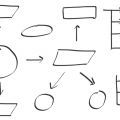
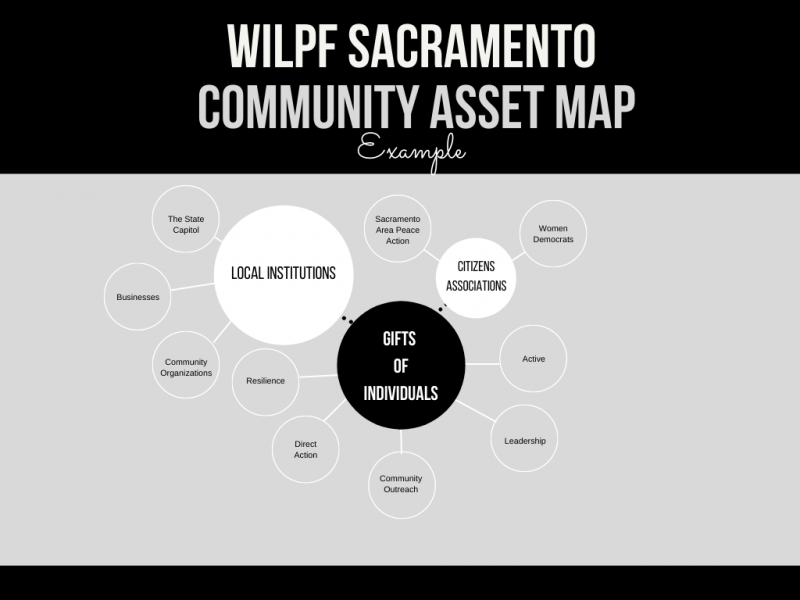 Asset mapping refers to the process of creating a visual inventory of the skills, talents, and resources that exist within a branch. It is not just another list of resources; It is a strategy to identify assets that are available from within the branch, more importantly it’s a process for connecting and engaging the branch and to unlock the talents of people to help solve problems and build a better and stronger branch.
Asset mapping refers to the process of creating a visual inventory of the skills, talents, and resources that exist within a branch. It is not just another list of resources; It is a strategy to identify assets that are available from within the branch, more importantly it’s a process for connecting and engaging the branch and to unlock the talents of people to help solve problems and build a better and stronger branch.




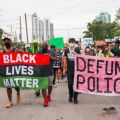

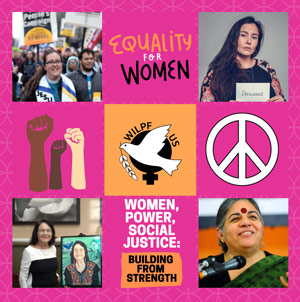 There were 28 webinars: from “HOW TO’S – Seeking Solutions” on weekday evenings, grounded in building local pathways to strengthening legislative advocacy, membership, fundraising, building branches, calling out the military recruitment of youth, preserving branch history, caring for the homeless and newly housed and children’s peace camps, to presentations as far away as Ghana and the Americas - Costa Rica and Cuba; Europe – Norway; Middle East -Lebanon, Palestine, and Israel seeking peaceful solutions.
There were 28 webinars: from “HOW TO’S – Seeking Solutions” on weekday evenings, grounded in building local pathways to strengthening legislative advocacy, membership, fundraising, building branches, calling out the military recruitment of youth, preserving branch history, caring for the homeless and newly housed and children’s peace camps, to presentations as far away as Ghana and the Americas - Costa Rica and Cuba; Europe – Norway; Middle East -Lebanon, Palestine, and Israel seeking peaceful solutions.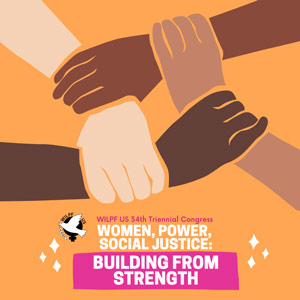 Branches’ and Issue Committees’ input not covered above: After Theoharis’s opening, the Poor People’s Campaign women presented the way to collectively “lift up” those voices mired in poverty. The Philadelphia Branch focused on “Breaking Out of White Supremacy.” The San Diego branch gave impetus to “Turning Down Post-Trump Escalation.” WILPF Des Moines Branch is working with Daoud Nassar, Palestinian farmer (Tent of Nations farm), to write a children’s book about this annual summer children’s camp. The Sacramento Branch interviewed Millee Livingston and Natalie Pahley Zapata on how to grow a peace camp for youth.
Branches’ and Issue Committees’ input not covered above: After Theoharis’s opening, the Poor People’s Campaign women presented the way to collectively “lift up” those voices mired in poverty. The Philadelphia Branch focused on “Breaking Out of White Supremacy.” The San Diego branch gave impetus to “Turning Down Post-Trump Escalation.” WILPF Des Moines Branch is working with Daoud Nassar, Palestinian farmer (Tent of Nations farm), to write a children’s book about this annual summer children’s camp. The Sacramento Branch interviewed Millee Livingston and Natalie Pahley Zapata on how to grow a peace camp for youth.
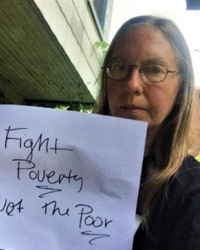 Pat Albright is a low-income single mother with a disability and is a former welfare recipient. She is part of the Every Mother is a Working Mother Network organizing for our work as mothers and caregivers to be valued and paid for. She is a member of the New York State Coordinating Committee of the Poor people’s Campaign: A National Call for Moral Revival.
Pat Albright is a low-income single mother with a disability and is a former welfare recipient. She is part of the Every Mother is a Working Mother Network organizing for our work as mothers and caregivers to be valued and paid for. She is a member of the New York State Coordinating Committee of the Poor people’s Campaign: A National Call for Moral Revival. Selma James launched the unfinished debate on “women’s work” in a 1971 radio broadcast. Today, at 92, she continues to press the case for caregiver wages as an essential component of a social order for survival. Her latest book—Our Time Is Now: Sex, Race, Class, and Caring for People and Planet-- deftly and deeply analyses the impediments to and the promise of a system we can and must create. Selma was the founder of the international Wages for Housework campaign in 1971 and continues as the international coordinator of the Global Women’s Strike. Her book is widely available, but she asks that we support independent publishing by ordering from
Selma James launched the unfinished debate on “women’s work” in a 1971 radio broadcast. Today, at 92, she continues to press the case for caregiver wages as an essential component of a social order for survival. Her latest book—Our Time Is Now: Sex, Race, Class, and Caring for People and Planet-- deftly and deeply analyses the impediments to and the promise of a system we can and must create. Selma was the founder of the international Wages for Housework campaign in 1971 and continues as the international coordinator of the Global Women’s Strike. Her book is widely available, but she asks that we support independent publishing by ordering from 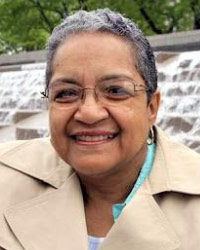 Marian Kramer is a civil rights, poverty, and labor activist based in Detroit, Michigan. She got involved with the Civil Rights Movement as a child, attending community meetings and rallies with family members. She emerged as a leader in the National Welfare Rights Organization (NWRO) in the 1960s and continues her work today as cofounder, in 1987, and current chair of its successor organization, the National Welfare Rights Union (NWRU). Since the 1960s, the welfare rights movement has organized for the right to an adequate caregiver wage, whether the work be done in or outside the home. Marian is the recipient of numerous awards, including an Alston/Bannerman Fellowship for esteemed, long-time community activists of color.
Marian Kramer is a civil rights, poverty, and labor activist based in Detroit, Michigan. She got involved with the Civil Rights Movement as a child, attending community meetings and rallies with family members. She emerged as a leader in the National Welfare Rights Organization (NWRO) in the 1960s and continues her work today as cofounder, in 1987, and current chair of its successor organization, the National Welfare Rights Union (NWRU). Since the 1960s, the welfare rights movement has organized for the right to an adequate caregiver wage, whether the work be done in or outside the home. Marian is the recipient of numerous awards, including an Alston/Bannerman Fellowship for esteemed, long-time community activists of color.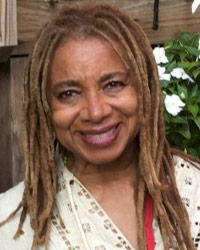 Margaret Prescod is a decades long community-based women’s rights, anti-poverty and anti-racist campaigner at local, national and international levels. She is the host of “Sojourner Truth” a nationally syndicated drive time public affairs program on Pacifica Radio. She worked with welfare rights leaders in the 1977 Congressionally-mandated conference on women to win a resolution that called for welfare to be called a wage. Margaret has expanded and continued that work through the decades a co-founder of Black Women for Wages for Housework, as a founding member of Women of Color/Global Women’s Strike and as founder of the Every Mother is a Working Mother Network and the Black Coalition Fighting Back Serial Murders.
Margaret Prescod is a decades long community-based women’s rights, anti-poverty and anti-racist campaigner at local, national and international levels. She is the host of “Sojourner Truth” a nationally syndicated drive time public affairs program on Pacifica Radio. She worked with welfare rights leaders in the 1977 Congressionally-mandated conference on women to win a resolution that called for welfare to be called a wage. Margaret has expanded and continued that work through the decades a co-founder of Black Women for Wages for Housework, as a founding member of Women of Color/Global Women’s Strike and as founder of the Every Mother is a Working Mother Network and the Black Coalition Fighting Back Serial Murders.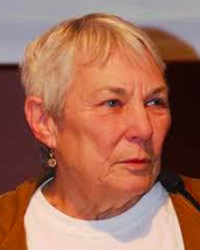 Moderator Mary Bricker-Jenkins is a member of the board of the National Welfare Rights Union and a past Program Chair on the WILPF-US board.
Moderator Mary Bricker-Jenkins is a member of the board of the National Welfare Rights Union and a past Program Chair on the WILPF-US board.


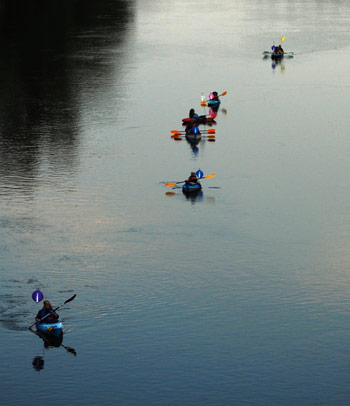 The Corvallis, Oregon WILPF branch paired up with Veterans For Peace, Chapter 132, Linus Pauling chapter to hold our annual commemoration which featured live traditional Japanese koto music, the reading of a letter written by June Ikako Terasaka Moore, a 93-yo Hibakusha woman who lives in Corvallis, and a group recitation of a community affirmation denouncing war and nuclear weapons. Following the program, participants had a candlelight procession to a bridge from which we watched a lantern-lit flotilla of kayaks and canoes come up the Willamette River and pass under us.
The Corvallis, Oregon WILPF branch paired up with Veterans For Peace, Chapter 132, Linus Pauling chapter to hold our annual commemoration which featured live traditional Japanese koto music, the reading of a letter written by June Ikako Terasaka Moore, a 93-yo Hibakusha woman who lives in Corvallis, and a group recitation of a community affirmation denouncing war and nuclear weapons. Following the program, participants had a candlelight procession to a bridge from which we watched a lantern-lit flotilla of kayaks and canoes come up the Willamette River and pass under us. 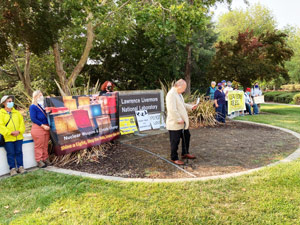 WILPF East Bay (California) co-sponsored a gathering outside the main gate of Lawrence Livermore National Lab, in Livermore CA on both 6th & 9th August, the associated photo shows one of the hibakusha, Nagasaki A-bomb survivor Nobu Hanaoka who spoke. Marylia Kelley of TriValley Cares reported: “Among other things, the Lab tried to drown out our opening with a lawnmower! But we brought truth and light and would not be “turned around” by garden equipment. “ The in-person demo was followed by a virtual, streamed on the web, event featuring nuclear analyst and whistleblower Daniel Ellsberg, Nell Myhand, Tsukuru Fors, John Burroughs, Marylia Kelley, and Marshallese climate activists, all dedicated to the abolition of nuclear weapons. Musicians Betsy Rose, Benjamin Mertz, and Francis Wong provided the music.
WILPF East Bay (California) co-sponsored a gathering outside the main gate of Lawrence Livermore National Lab, in Livermore CA on both 6th & 9th August, the associated photo shows one of the hibakusha, Nagasaki A-bomb survivor Nobu Hanaoka who spoke. Marylia Kelley of TriValley Cares reported: “Among other things, the Lab tried to drown out our opening with a lawnmower! But we brought truth and light and would not be “turned around” by garden equipment. “ The in-person demo was followed by a virtual, streamed on the web, event featuring nuclear analyst and whistleblower Daniel Ellsberg, Nell Myhand, Tsukuru Fors, John Burroughs, Marylia Kelley, and Marshallese climate activists, all dedicated to the abolition of nuclear weapons. Musicians Betsy Rose, Benjamin Mertz, and Francis Wong provided the music.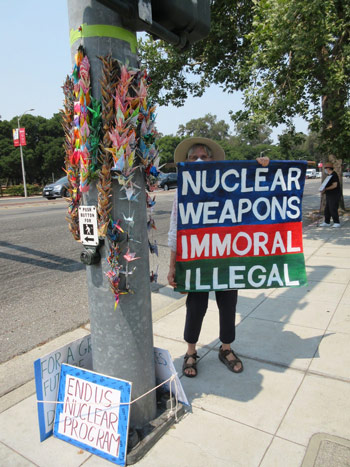 The Peninsula/Palo Alto, CA WILPF members, joined by some community peace activists, stood in vigil commemorating the Hiroshima/Nagasaki bombings, at the busy intersection of El Camino and Embarcadero in Palo Alto from noon to 2 pm on Friday August 6. Our signs and banners urged the U.S. and other nuclear powers to sign the TPNW and transfer funds from the military to human needs. We displayed some of the 1000 remaining paper cranes from our July/August 2020 installation of 2080 paper peace cranes outside a local art gallery. We put garlands of peace cranes on light poles and handed others out to pedestrians with a flyer about WILPF. WE had passers-by sign a petition to the US Senate about the TPNW. Watch this video to learn how 2080 cranes were made and displayed by local residents:
The Peninsula/Palo Alto, CA WILPF members, joined by some community peace activists, stood in vigil commemorating the Hiroshima/Nagasaki bombings, at the busy intersection of El Camino and Embarcadero in Palo Alto from noon to 2 pm on Friday August 6. Our signs and banners urged the U.S. and other nuclear powers to sign the TPNW and transfer funds from the military to human needs. We displayed some of the 1000 remaining paper cranes from our July/August 2020 installation of 2080 paper peace cranes outside a local art gallery. We put garlands of peace cranes on light poles and handed others out to pedestrians with a flyer about WILPF. WE had passers-by sign a petition to the US Senate about the TPNW. Watch this video to learn how 2080 cranes were made and displayed by local residents: 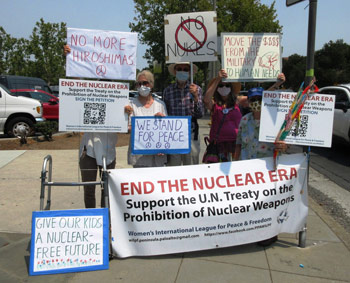
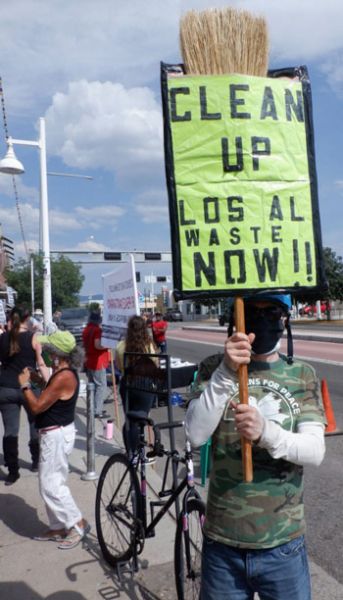
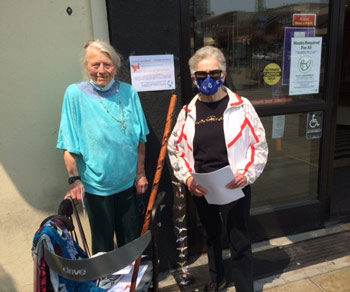 Photo (left): Deetje Boler and Anne Politeo leafleting in San Francisco’s Japan Town on 6 August. Photo by Betty Traynor, used with her permission.
Photo (left): Deetje Boler and Anne Politeo leafleting in San Francisco’s Japan Town on 6 August. Photo by Betty Traynor, used with her permission.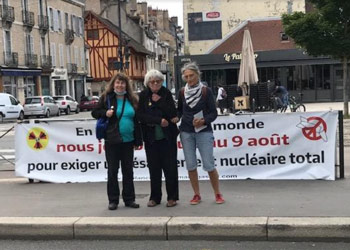 Ann Arbor branch member, Odile Hugonot Haber was visiting Dijon, France in August and she joined a fast for nuclear disarmament from 6th to 9th August.
Ann Arbor branch member, Odile Hugonot Haber was visiting Dijon, France in August and she joined a fast for nuclear disarmament from 6th to 9th August.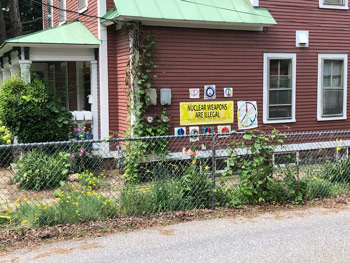 The WILPF Burlington Branch, Vermont International Film Festival, and Burlington City Arts sponsored a Hiroshima and Nagasaki commemorative event on Thursday, August 5th at the City Hall Park between College St. and Main St. in Burlington, VT. The event had activities for both youth and adults, including painting for peace, origami crane folding, sidewalk chalk drawing, a penny spending survey, the telling of the Sadako story, and information & resources table. That evening Dr. John Reuwer led a discussion on the risks of nuclear weapons and the possibilities for eliminating them. Then they showed the classic film, Dr. Strangelove or: How I Learned to Stop Worrying and Love the Bomb.
The WILPF Burlington Branch, Vermont International Film Festival, and Burlington City Arts sponsored a Hiroshima and Nagasaki commemorative event on Thursday, August 5th at the City Hall Park between College St. and Main St. in Burlington, VT. The event had activities for both youth and adults, including painting for peace, origami crane folding, sidewalk chalk drawing, a penny spending survey, the telling of the Sadako story, and information & resources table. That evening Dr. John Reuwer led a discussion on the risks of nuclear weapons and the possibilities for eliminating them. Then they showed the classic film, Dr. Strangelove or: How I Learned to Stop Worrying and Love the Bomb.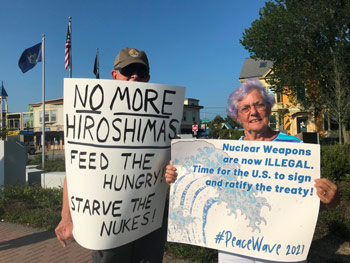 #PeaceWave_2021_Maine was held on Friday Aug 6 on the Brunswick Green in Maine to Commemorate H&N, to collect signatures for the petition calling on President/Senate to sign & Ratify the TPNW, to collect words & stories from those persons present, and to educate ourselves about the #TreatyBan TPNW, and to read excerpts from the Ban Treaty text. There is an 8 minute video of the Maine branch event on You Tube, watch here:
#PeaceWave_2021_Maine was held on Friday Aug 6 on the Brunswick Green in Maine to Commemorate H&N, to collect signatures for the petition calling on President/Senate to sign & Ratify the TPNW, to collect words & stories from those persons present, and to educate ourselves about the #TreatyBan TPNW, and to read excerpts from the Ban Treaty text. There is an 8 minute video of the Maine branch event on You Tube, watch here: 

